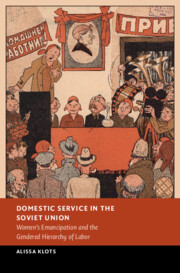Book contents
- Domestic Service in the Soviet Union
- New Studies in European History
- Domestic Service in the Soviet Union
- Copyright page
- Contents
- Figures
- Acknowledgments
- Introduction
- Prologue
- Part I Servants into Workers, 1920s
- Part I Introduction
- Chapter 1 From Exploitation to Socially Useful Labor
- Chapter 2 Just Like Any Other Worker? Class, Gender, and Labor Rights
- Chapter 3 Kitchen Maids in the School of Communism
- Chapter 4 The New Soviet Domestic Worker
- Part I Conclusion
- Part II In the Land of Victorious Socialism, 1930s–1950s
- Conclusion
- Bibliography
- Index
Chapter 3 - Kitchen Maids in the School of Communism
Union Work and Political Mobilization
from Part I Introduction
Published online by Cambridge University Press: 25 April 2024
- Domestic Service in the Soviet Union
- New Studies in European History
- Domestic Service in the Soviet Union
- Copyright page
- Contents
- Figures
- Acknowledgments
- Introduction
- Prologue
- Part I Servants into Workers, 1920s
- Part I Introduction
- Chapter 1 From Exploitation to Socially Useful Labor
- Chapter 2 Just Like Any Other Worker? Class, Gender, and Labor Rights
- Chapter 3 Kitchen Maids in the School of Communism
- Chapter 4 The New Soviet Domestic Worker
- Part I Conclusion
- Part II In the Land of Victorious Socialism, 1930s–1950s
- Conclusion
- Bibliography
- Index
Summary
The low status of domestic service in the Soviet hierarchy of labor undermined efforts to politicize domestic workers through union mobilization. The appeal of “productive” work inspired domestics to use their activism as springboard for careers outside of domestic service rather than for organizing their peers. Domestics’ reluctance to engage with the union only confirmed the long-standing suspicion that domestic service fostered “lackey’s souls” rather than conscious proletarian selves. This chapter provides insight into the problem of marginalized workers that have largely been excluded from organized labor. While the difficulty in organizing domestic workers is often negatively affected by their vulnerability and dependency on employers, the low status of housework in the gendered hierarchy of labor poses a different challenge as it conditions household workers to invest in changing careers rather than strengthening their labor organization.
- Type
- Chapter
- Information
- Domestic Service in the Soviet UnionWomen's Emancipation and the Gendered Hierarchy of Labor, pp. 92 - 114Publisher: Cambridge University PressPrint publication year: 2024

